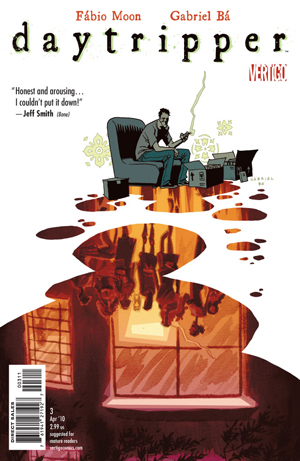I’ve threatened to expand our coverage for some time. And content is still king. It’s why we buy the gadgets we buy. So maybe it’s a wee bit ironic that we’re diving in with a primarily print medium. But it so just happens that I know a pair of comics experts in my old high school buddy Chad and his wife Janice. So let’s get this experiment rolling! -DZ
By: Fábio Moon & Gabriel Bá
Coloring: Dave Stewart
Lettering: Sean Konot
I wanted to review Daytripper when the first issue came out, before our blog existed. We set it up and issue two came out, and I still wanted to review it. I couldn’t bring myself to do it, though, and I’m glad I waited. Reviewing this series on the first issue wouldn’t have done it any justice or allowed me to really say anything; as it stands, I’m still hesitant to speak up on the third issue, because it’s going to be a work that’s judged on its whole. In a market where a great book like S.W.O.R.D. gets cancelled by the numbers on its third issue, it’s a pretty bold statement on Vertigo’s part to release something that’s not even going to really start to make sense until issue three. A lot of things started to click for me when I read “28″ last night, however, and I feel like it’s time to talk about it.
One of the best discoveries I made in film school was the work of Krzysztof Kieślowski. He had a way of taking normal, everyday moments in life and elevating them to levels of great importance and meaning. This worked to tie the everyday existence of his characters into the arching theme of the film, oftentimes resulting in the medium itself or one of its aspects taking a role as one of the characters. The camera in Red is as much an actor as Irène Jacob; the music in Blue is working as hard as Juliette Binoche. They all, in turn, work towards the common meaning, avoiding hitting the viewer over the head with it but still carrying the message. It’s done with purpose, but not didactically, and the end result is lyrical.
Bá and Moon are in the process of accomplishing the same thing with Daytripper. On the surface, each issue is a slice of Brás de Oliva Domingos’ life; not random, meaningless moments, but the normal points of focus we all encounter. The day we meet someone, the day they leave our lives. A trip somewhere you may never go again, an important milestone for someone close to you.
